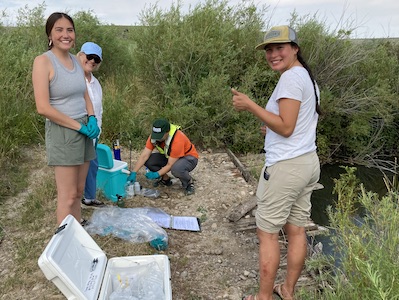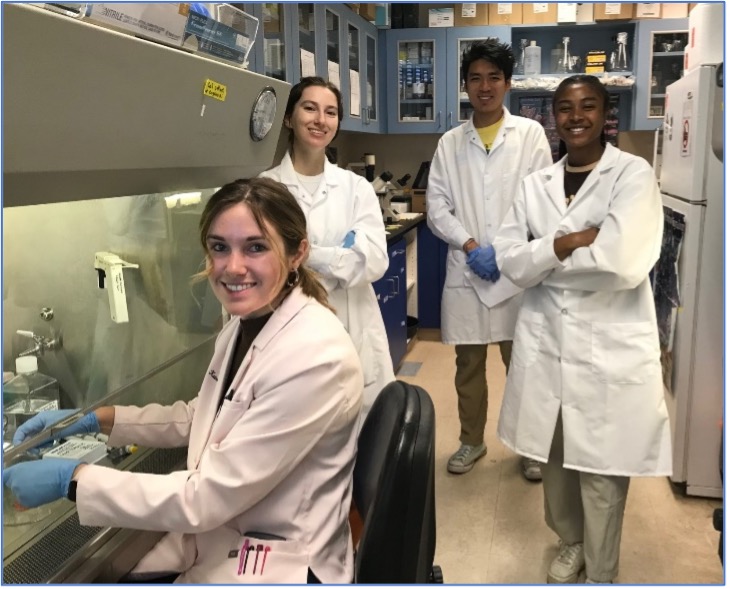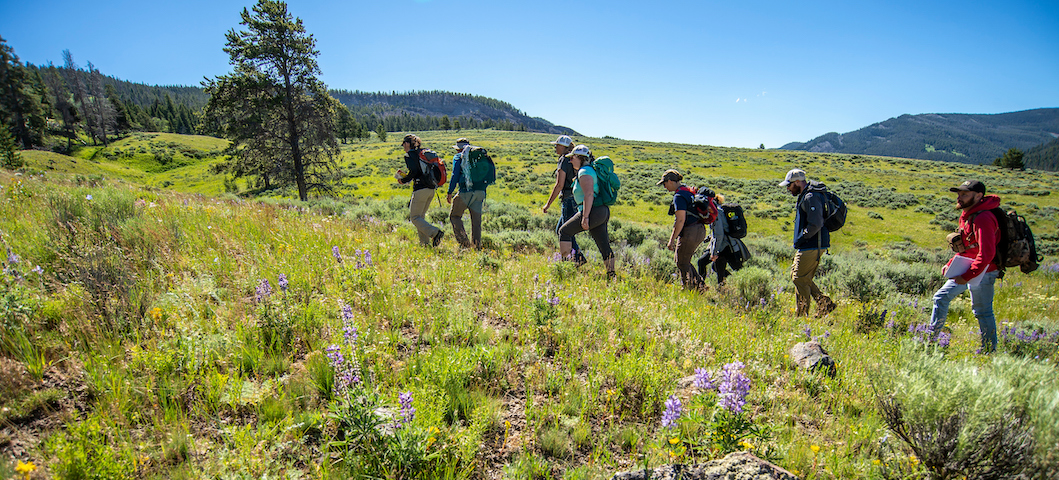PREP-MT Post Baccalaureate Progam
Considering graduate school in a health field but not sure where to start?
Join MSU’s PREP-MT post-baccalaureate program for diverse scholars!
Now recruiting the next cohort of PREP-MT scholars. Applications will be accepted starting October 1, 2024 - February 15, 2025. Appointment term begins June 1, 2025 and ends May 31, 2026.
Priority registration deadline is February 15, 2025.
The PREP-MT program is designed to provide a pathway to Ph.D. programs in the life sciences for bachelor’s program graduates by offering a mentored research experience, career development workshops, peer support, and additional coursework. Our program particularly seeks to enhance research participation from groups that are traditionally underrepresented in research careers, in line with MSU’s strategic goal to broaden access for underrepresented populations. We especially welcome applications from students who are:
- from disadvantaged backgrounds and/or from non-research-intensive universities, tribal colleges, and community colleges.
- first-generation college attenders, non-traditional, veterans, and disabled students.
- from groups who are historically underrepresented in STEM (Science, Technology, Engineering, and Mathematics), including students who are Indigenous, Hispanic/Latinx, Black, Pacific Islander, and/or LGBTQIA+.

Crow Water Quality Project interns sample water and sediments for PFAS and other contaminants, Crow Reservation, MT.
Program benefits
- A year of research experience with a dedicated mentor and mentoring team
- Choice of biomedical research, environmental health, biomedical engineering, Tribal/rural/community health, many other fields
- Professional development and support in applying to graduate school
- Career development workshops to prepare you for a PhD program
- Opt to take up to two graduate classes per semester to strengthen skills
- One-year, full time research position with salary & benefits
- Can apply earned credit towards graduate degree at MSU

Research trainees in Microbiology at MSU are culturing gastric organoids from a tissue sample for studying Helicobacter pylori infection.
Eligibility:
- Graduating with a bachelor’s degree between May 2022 and May 2025 in a health-related discipline.
- GPA of ≥ 3.0, improved GPAs considered.
- Aspiring to earn a Ph.D.
- U.S. Citizen or permanent resident
- This program will not support individuals earning master's degrees or individuals who have previously earned a graduate or professional degree.
Application deadline: January 31, 2025.
Inquiries: PREP-MT@montana.edu or stop by Lewis Hall, 109 at Montana State University.
Required Application Materials
- Transcripts (see "How to apply" below)
- Resume or CV
- One page personal statement describing motivation and career goals, and 2-3 mentors with whom you are interested in working from the list below.
- Two Letters of Recommendation from a professor, supervisor, employer, etc. who can speak to your abilities and potential as a researcher. At least one should be from a professor or academic mentor. (see "How to apply" below)
- Residency information (see "How to apply" below)
How to apply
5.
1. Please apply through MSU's graduate school portal, https://www.applyweb.com/msug/index.ftl. You will need to create a secure login; please check your spam filters as confirmation may route into your junk/spam folders.
2. Once you start the application, note that at the bottom of the first page, you will indicate interest in Non-Degree.
3. The next page will open, and you will make your official selection of PREP-MT, Non-Degree, the Fall 2025 term - then press "Select Program".
4. You will move through the application page by page. If you are a resident in the State of Montana, you will need to supply residency materials, i.e., Montana DL, MT vehicle registration, MT voter card, 2023/2024 Montana taxes [first page with residency and financials], etc.
5. You will need to submit two letters of recommendation - do this by providing the contact information for your references, and they will be issued an email prompt to submit their letters.
6. If you are not a student of MSU-Bozeman, you will need to have official transcripts sent to our university from your university (where you obtained your bachelor's degree); you will see information on where they should be sent on page 2 of the application.
7. You will need to respond to the Personal Statement question and supply this on page 9 of the application.
8. You are required to supply a resume or CV.
9. On the last page of the application, there will be a blue box "Click here to enter GSD Number" - which you should press.
10. Another field will open, and you can enter the Fee Code and press submit; if you receive a message that you need to pay for the application - please contact prep-mt@montana.edu.
11. Any additional documents can be uploaded at the end of the application - where there is a spot for "Additional Materials".
Check out the mentors available for the Prep MT Program.
|
List of Mentors |
||||
|
Name |
Department |
Research Interests |
Read more |
|
|
Carl Yeoman |
Animal and Range Sciences |
Microbial Ecology; Bioinformatics |
||
|
Alexandra Adams |
Sociology and Anthropology |
American Indian and rural health |
||
|
Phil Stewart |
Chemical and Biological Engineering |
Medical biofilms |
|
|
|
Stefanie McCalla |
Microfluidics, disease diagnostics |
|
||
|
Brian Bothner |
Chemistry and Biochemistry
|
Cellular stress response, protein complexes |
|
|
|
Martin Lawrence |
Virology, structural biology |
|
||
|
Seth Pincus |
HIV, Immunotherapy |
|
||
|
Valerie Copie |
Cellular metabolomics, NMR spectroscopy |
|
||
|
Joan Broderick |
Bioinorganic chemistry, radicals in biology |
|
||
|
Anja Kunze |
Electrical Engineering |
Neuronal function and modeling |
|
|
|
Suzanne Held |
Health and Human Development |
Community-based participatory research |
|
|
|
Vanessa Simonds |
Health literacy among Native Americans |
|||
|
Mark Schure |
Novel interventions for improving mental wellbeing |
|
||
|
Elizabeth Rink |
Sexual and reproductive health, community based participatory research |
|
||
|
Tim McDermott |
Land Resources and Environmental Sciences |
Microbe-Arsenic Interactions, metabolomics |
||
|
Mensur Dlakic |
Microbiology and Cell Biology |
Protein homology, comparative genomics |
|
|
|
Matt Taylor |
Neuroinvasive viruses |
|
||
|
Blake Wiedenheft |
Bacterial immune systems, structural biology, CRISPR |
|
||
|
Diane Bimczok |
Mucosal immunology, organoid models, dendritic cells |
|
||
|
Douglas Kominsky |
Mucosal immunology, epithelial cells |
|
||
|
Edward Schmidt |
Gene regulation, redox biology, development |
|
||
|
Mari Eggers |
Environmental health, climate impact on health |
|
||
|
Michael Franklin |
Microbial physiology, biofilm antibiotic resistance |
|
||
|
Steve DeLuca |
Transcriptional regulation of cell development |
|
||
|
Alyssa Evans |
Viral infection and immunity, orthobunyaviruses |
|
||
|
Aga Rynda-Apple |
Respiratory infections and immunology, influenza virus |
|
||
|
Jovanka Voyich |
Neutrophil response to gram-positive bacteria |
|
||
|
Seth Walk |
Gastrointestinal microbiome |
|
||
|
Christa Merzdorf |
Early development of the nervous system |
|
||
|
Ron June |
Mechanical and Industrial Engineering |
Biomechanics, mechanobiology in osteoarthritis |
||
|
Neha John-Henderson |
Psychology |
Social disparities in health, psychoneuroimmunology |
||
This program is funded by the National Institutes of Health R25 Postbaccalaureate Research Education Program, grant 1R25GM152359, "PREP-MT: Providing Research Education for Postbaccalaureate Trainees in Montana", awarded to Drs. Diane Bimczok, Mari Eggers, Vanessa Simonds and Douglas Kominsky.

